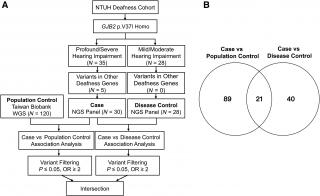Nov, 2023

Recessive variants in GJB2 are the most important genetic cause of sensorineural hearing impairment (SNHI) worldwide. Phenotypes vary significantly in GJB2-related SNHI, even in patients with identical variants. For instance, patients homozygous for the GJB2 p.V37I variant, which is highly prevalent in the Asian populations, usually present with mild-to-moderate SNHI; yet severe-to-profound SNHI is occasionally observed in approximately 10% of p.V37I homozygotes. To investigate the genomic underpinnings of the phenotypic variability, we performed next-generation sequencing of GJB2 and other deafness genes in 63 p.V37I homozygotes with extreme phenotypic severities. Additional pathogenic variants of other deafness genes were identified in five of the 35 patients with severe-to-profound SNHI. Furthermore, case-control association analyses were conducted for 30 unrelated p.V37I homozygotes with severe-to-profound SNHI against 28 p.V37I homozygotes with mild-to-moderate SNHI, and 120 population controls from the Taiwan Biobank. The severe-to-profound group exhibited a higher frequency of the crystallin lambda 1 (CRYL1) variant (rs14236), located upstream of GJB2, than the mild-to-moderate and Taiwan Biobank groups. Our results demonstrated that pathogenic variants in other deafness genes and a possible modifier, the CRYL1 rs14236 variant, may contribute to phenotypic variability in GJB2-realted SNHI, highlighting the importance of comprehensive genomic surveys to delineate the genotype-phenotype correlations.